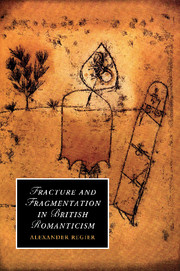Book contents
- Frontmatter
- Contents
- Acknowledgements
- List of abbreviations
- Broken origins: an introduction
- 1 A brotherhood is broken: Babel and the fragmentation of language
- 2 Figuring it out: the origin of language and anthropomorphism
- 3 Forces trembling underneath: the Lisbon earthquake and the sublime
- 4 A blue chasm: Wordsworth's The Prelude and the figure of parenthesis
- 5 Letters from the grave: John Keats's fragmented corpus
- 6 The doubling force of citation: De Quincey's Wordsworthian archive
- 7 Philological fractures: Paul de Man's Romantic rhetoric
- Notes
- Bibliography
- Index
- CAMBRIDGE STUDIES IN ROMANTICISM
- References
Bibliography
Published online by Cambridge University Press: 06 July 2010
- Frontmatter
- Contents
- Acknowledgements
- List of abbreviations
- Broken origins: an introduction
- 1 A brotherhood is broken: Babel and the fragmentation of language
- 2 Figuring it out: the origin of language and anthropomorphism
- 3 Forces trembling underneath: the Lisbon earthquake and the sublime
- 4 A blue chasm: Wordsworth's The Prelude and the figure of parenthesis
- 5 Letters from the grave: John Keats's fragmented corpus
- 6 The doubling force of citation: De Quincey's Wordsworthian archive
- 7 Philological fractures: Paul de Man's Romantic rhetoric
- Notes
- Bibliography
- Index
- CAMBRIDGE STUDIES IN ROMANTICISM
- References
- Type
- Chapter
- Information
- Fracture and Fragmentation in British Romanticism , pp. 220 - 236Publisher: Cambridge University PressPrint publication year: 2010



